EU Concerned About Iran’s Weapons Support For Russia: Axios
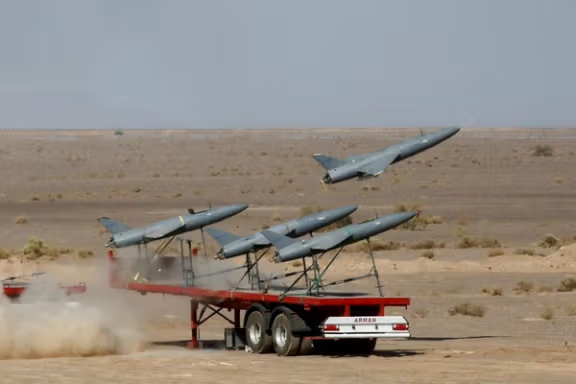
Axios has revealed more details about the European Union’s plan to impose sanctions on Iran’s Revolutionary Guard over drones supplied to Russia.

Axios has revealed more details about the European Union’s plan to impose sanctions on Iran’s Revolutionary Guard over drones supplied to Russia.
Axios quoted two EU officials on Wednesday as saying that the European Union is expected to impose sanctions on seven entities connected to the IRGC that the bloc believes are involved in the delivery of drones to Russia for its war against Ukraine.
According to the report, one senior EU official stated the bloc is "much more concerned" about Tehran’s weapons support for Moscow than it was before.
"The IRGC is much more the focus than it used to be, and there is a real change of mindset."
The sources also noted that the package of sanctions was formally presented on Wednesday in a meeting of the European Commission.
“The package includes sanctions against the IRGC Aerospace Force, which the bloc says is involved in the delivery of drones to Russia and the training of Russian operators, and the IRGC Research and Self-Sufficiency Jihad Organization,” revealed Axios.
The package also includes sanctions against the Russian company Concern Morinformsystem–Agat, the officials said.
Iran has been supplying Shahed kamikaze drones to Russia since mid-2022 that have been used in large numbers against Ukrainian infrastructure targets.
Iran initially denied supplying drones to Russia, but as physical evidence of their use in Ukraine built up foreign minister Hossein Amir-Abdollahian admitted the transfer, claiming that drones were sent before the Ukraine war.
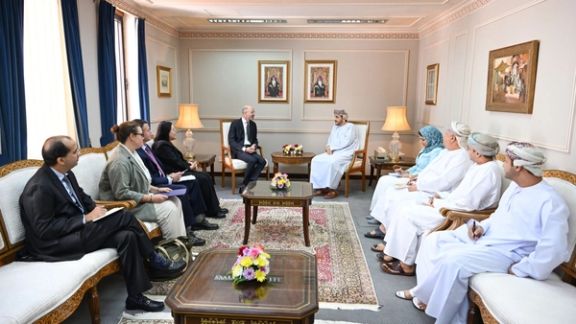
US Special Envoy for Iran Robert Malley held talks with Omani officials about Iran, as reports emerged of indirect talks to free US prisoners held in Tehran.
Malley tweeted a photo of his meeting with Sheikh Khalifa Al Harthy, Foreign Ministry Undersecretary for Diplomatic Affairs, on Wednesday, saying they discussed deepening their close partnership on a range of issues related to Iran. “I also reiterated our thanks to Oman for their help securing Baquer Namazi’s release,” Malley added.
Namazi was held hostage in Iran for more than six years and was released in October.
Later in the day, US State Department spokesman Ned Price said, “Oman has played a constructive role across the Middle East... in the region in the past. It has been a bridge-builder between countries that do not always see eye-to-eye. Rob (Malley) tweeted this morning that he had a very good set of meetings in Oman. They discussed a number of issues related to Iran.”
NBC had reported earlier that $7 billion of Iran’s funds held in South Korea will be released as part of a prisoner deal.
Iran International’s correspondent asked Price if the US is willing to give the Iranian people assurances that any released funds are not going to end up in IRGC’s hands. Price responded that he is not in a position to confirm or deny any reports.
“We engage with our partners around the world to thank them for upholding the sanctions regime that is in place and will be in place until and unless Iran addresses the challenge that its nuclear program poses to the United States; poses to our allies and partners and poses to the broader region,” he added.
Circumventing a direct answer about contacts to resume the talks aimed at reviving the JCPOA, he said that “even when relations are at a low we are able to pursue our interests and to pursue them effectively in the midst of Russia's brutal war against Ukraine despite everything that we're doing to support our Ukrainian partners and everything we impose on Russia as a result of its brutal aggression we've been able to bring home we've been able to bring home Brittney Griner.”
He added that bringing Americans home will always be profoundly in our interests and even when relations are at a low or maybe close to that point, we are determined to do everything we can to secure the safety and the well-being of our citizens.”
Praising the “instrumental role Oman has played to solve challenges helping to bridge divides,” he said that Oman “did play a very useful and important role in the decision on the part of the Iranian regime’s release of Baquer Namazi.”
“They were very supportive as part of our long-standing persistent efforts to see all of our wrongful detainees... to help effectuate them release from the Iranian custody.”
“So, we thank Oman for the role it has played, and we continue to consult closely with Oman on Challenges near and far and Rob’s engagement was part of that.”
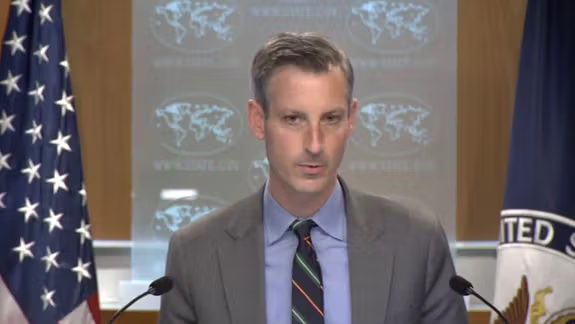
Seif al-Adel, the apparent new leader of al Qaeda is in Iran, a United Nations report has said and the United States confirmed the information on Wednesday.
State Department spokesperson Ned Price was asked during his daily press briefing to comment on the UN report. He said: “Our assessment aligns with that of the UN…offering safe haven to al Qaeda is another example of Iran’s wide-ranging support for terrorism, its destabilizing activities in the Middle East and beyond.”
Asked by a reporter what the United States is ready to do if Adel is in Iran, Price said that the Biden administration is determined not to allow threats to emerge. “We have taken action against Iran for its support for terrorist group throughout the region,” he said and added that Washington will closely coordinate with European allies to confront “all the challenges Iran poses.”
Seif al-Adel, a former Egyptian special forces officer who is a high-ranking member of al Qaeda with a $10 million US bounty on his head, is now the "uncontested" leader of the militant group, according to a new U.N. report on the organization.
Al Qaeda has not formally named a successor for Ayman al-Zawahiri, who was believed to have been killed in a US missile strike in Kabul last year, dealing a blow to the organization since its founder Osama bin Laden was killed in 2011.
Although a US intelligence official said in January that Zawahiri's succession remained unclear, the United Nations report assessing risks from the group said: "In discussions in November and December, many Member States took the view that Seif al-Adel is already operating as the de facto and uncontested leader of the group."
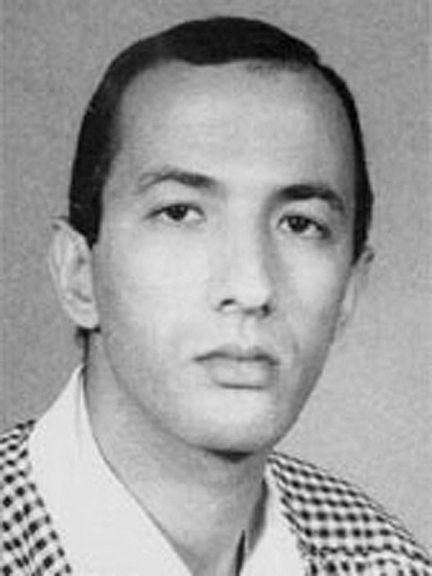
Unlike his slain predecessors who maintained a high profile with fiery videos broadcast around the globe threatening the United States, the experts say Adel planned attacks from the shadows as he helped turn al Qaeda into the world's deadliest militant group.
Adel was indicted and charged in November 1998 by a U.S. federal grand jury for his role in the bomb attacks on the US embassies in Tanzania and Kenya that killed 224 civilians and wounded more than 5,000 others.
The US State Department had already said that Adel was based in Iran. The department’s Rewards for Justice program is offering up to $10 million for information on Adel, whom it says is a member of "al Qaeda’s leadership council” and heads the organization’s military committee.
The program’s website says that after the Africa bombings, the former Egyptian army lieutenant colonel moved to southeastern Iran, where he lived under the protection of the country's Islamic Revolutionary Guard Corps.
He and other Al Qaeda leaders were placed under house arrest in April 2003 by Iran, which released him and four others in exchange for an Iranian diplomat who was kidnapped in Yemen.
Once Osama bin Laden's chief bodyguard and a senior trainer of militants, experts on the jihadi movement say Adel began his long bloody career in 1981, when he was suspected of involvement in the assassination by Islamist soldiers of Egyptian President Anwar al-Sadat during a military parade in Cairo that was broadcast on television.
One of al Qaeda's leading military chiefs and often called by experts its third-ranking official, Adel set up training camps for the organization in Sudan, Pakistan and Afghanistan in the 1990s.
He also played a role in the ambush of US helicopters in Mogadishu, known as the "Black Hawk Down" incident in 1993 which killed 18 US servicemen, security experts say. That marked the beginning of the eventual withdrawal of a US-UN peacekeeping force from Somalia.
The FBI identifies Adel as one of its most wanted terrorists and accuses him of conspiring to kill US nationals, to murder and destroy buildings of the United States.
"He (Adel) is a very bold, professional, cold-blooded figure," said Yoram Schweitzer, head of the Program on Terrorism and Low-Intensity Conflict at Tel Aviv University’s Institute for National Security Studies.
With reporting by Reuters
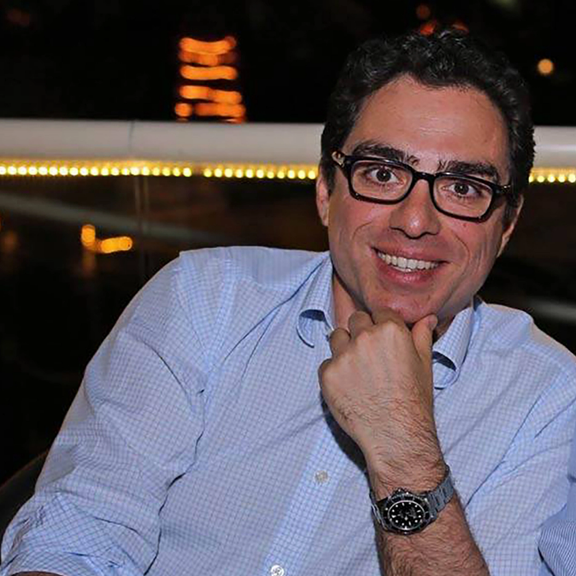
Washington is holding indirect talks with Tehran on a possible prisoner exchange in a bid to secure the release of several US citizens held hostage in Iran.
An NBC report published on Wednesday quoted four sources familiar with the matter saying that Qatar and Britain are easing the talks as intermediaries.
“The negotiations have made progress, but it remains unclear if a final agreement will be reached,” one of the sources said.
This comes as nuclear talks between Tehran and the world powers have been stalled for several months, as the United States and its European allies have imposed new sanctions against the clerical regime.
“The two sides are exploring a formula that has been discussed previously, dating to 2021, that could include a possible prisoner exchange and the release of billions of dollars in funds in South Korea banks currently blocked by US sanctions,” three sources with knowledge of the talks told NBC.
“In the discussions, US and Iranian diplomats have explored possible arrangements for how to transfer the frozen funds, with a third country such as Qatar possibly overseeing the transfer.”
Several Iranian-American citizens, including Siamak Namazi, Emad Sharqi, and Morad Tahbaz, are still imprisoned in Iran.
Earlier, Iran’s Foreign Ministry Spokesman Nasser Kanaani claimed, "We have said many times that we are ready for the exchange of prisoners unconditionally, and in this regard, we have showed goodwill."
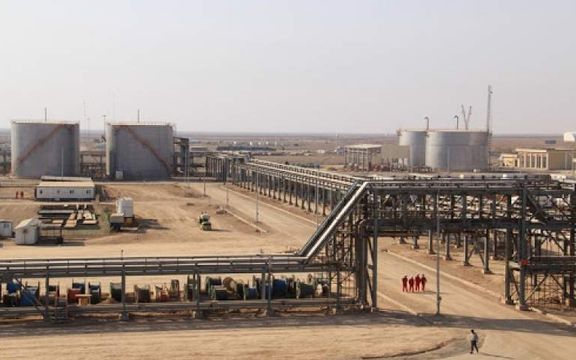
Iran has decided to develop its unfinished oil projects as Chinese companies are unwilling to continue joint plans, Iran’s oil ministry website reported Tuesday.
SHANA, the oil ministry’s news service quoted the director of Yadavarn Development Plan in southwest Iran as saying that “the development of the Yadavaran joint oilfield is expected to resume [by Iranian experts] in the next Iranian year (March 2023-24) with a credit line of $400 million.”
Mojtaba Moradi, an official, told SHANA that “the project seeks to increase the production capacity of the field by 42,000 barrels per day.”
“After about a six-year hiatus in development activities, the implementation of the project to increase the field’s output will begin,” he underlined.
“The development project will be carried out by Iranian experts and engineers, using domestically made parts and equipment,” he noted.
The development comes as President Ebrahim Raisi in is Beijing this week on an official visit discussing the implementation of a 25-year cooperation pact signed in 2021 as a general outline, but details have not been worked out.
However, according to moderate news website Rouydad 24, Moradi did not mention why the project is now being carried out by Iranian experts.
The Yadavaran hydrocarbon deposit shared with Iraq is located 70 kilometers west of the city of Ahvaz in Khuzestan Province near the Iraqi border.
Based on studies, the field's crude reserve is more than 34 billion barrels. The reserve's recovery rate for light and heavy crude oil stands at 15% and 7% respectively. Around 83,000 barrels of Yadavaran production are a blend of light crude and the rest is heavy crude.
Rouydad 24 quoted informed sources as saying that after the unofficial withdrawal of the Chinese company Sinopec, the National Iranian Oil Company has decided to continue the development of this field on its own.
“It is quite clear that the National Iranian Oil Company has reached a dead end in the negotiations with the Chinese and now decided to implement the second phase itself,” added Rouydad 24.
The Chinese have not yet reacted to the announcement, but according to the contract signed by the Ahmadinejad administration with Sinopec in 2007, the Chinese company developed the first phase, and the second phase was also supposed to be carried out by the same company. Sinopec started negotiations for the second phase in 2016, but so far there has been no result.
According to the deal Sinopec had a 51-percent share in the oil field, but it appears Beijing has been wary of violating US sanctions on Iranian oil exports, although it buys illicit shipments of crude from Iran.
The Chinese have said that the imposition of US sanctions against Iran in 2018 has hampered the process and that they should wait.
“When the Raisi administration took power, they were optimistic that the Chinese would invest in this field, but Beijing, for the time being, has no intention of investing there,” stressed Rouydad 24.
“In the past two years, the Chinese have increased their investment in countries like Saudi Arabia, the UAE, Kuwait, Iraq, and even Afghanistan, and have removed Iran from list of their priorities for the time being,” Rouydad 24 went on to say.
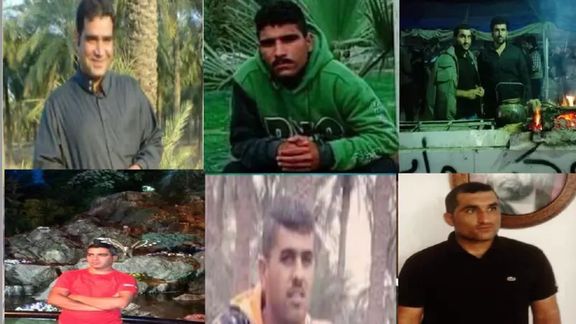
A human rights organization in Iran reports that a revolutionary court has sentenced six Arab political prisoners to death in the southern city of Ahvaz.
According to Ahvaz Human Rights Organization, the prisoners are identified as Ali Majdam, Moin Khanfari, Mohammad Reza Moghadam, Salem Mousavi, Adnan Mousavi and Habib Edris.
Six other Arab citizens have also been sentenced to long prison terms between 5 to 35 years, the report added.
The death sentences are issued while the Iranian authorities have released dozens of political prisoners and protesters in recent days, claiming an amnesty was issued for thousands of detainees.
Meanwhile, the Islamic Republic keeps putting pressure on activists and arrests continue. Hengaw Kurdish-Iranian human rights monitoring group reported that Arian Koukhaizadeh, an 18-year-old detained youth from the southwestern city of Ilam, went on a hunger strike by sewing his lips in protest at inattention to his case.
Narges Mansouri, one of the signatories of a letter calling for Supreme Leader Ali Khamenei's resignation, also announced in an audio file shared with Iran International that since January 29, in spite of acute illness, she began a hunger strike in protest to the inhumane behavior of the Islamic Republic.
Meanwhile, according to information received by Iran International, security agents are putting pressure on political activists, who signed a statement in support of Green Movement leader Mir-Hossein Mousavi’s call for a new constitution, to rescind their signatures.